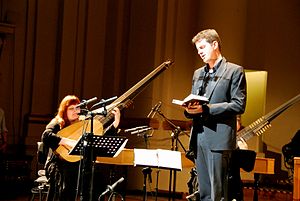
Summary
Christina Pluhar (Graz, 1965) is an Austrian theorbist, harpist, conductor, and director of L'Arpeggiata ensemble.[1]

After studies at the University of Graz, Christina Pluhar recognised her passion for ancient music. From then on, she devoted herself to playing the lute, theorbo and baroque guitar. She gained her knowledge at the Royal Conservatory of The Hague and at the Schola Cantorum Basiliensis. Her teachers included Toyohiko Satoh, Eugen Dombois, Hopkinson Smith, Paul O'Dette, Pat O'Brian and Jesper Bøje Christensen. She learned to play the baroque Arpa Doppia at the Scuola Civica di Milano with Mara Galassi.
In 1992, as a member of the Ensemble La Fenice, she received the first prize at the Festival of Early Music in Malmö. Since then she has been living in Paris and performing as a soloist and as a basso continuo player in the baroque scene. With her ensemble L'Arpeggiata, founded in 2000, she plays at international festivals and makes recordings.
In addition to her activities as a musician and ensemble director, Christina Pluhar has been teaching baroque harp at the Royal Conservatory of The Hague since 1999 and gives master classes at the University of Graz.
Discography edit
Albums edit
- 2004: Landi: homo fugit velut umbra
- 2004: Al Improvviso: Ciaconne, Bergamasche et un po' di folie
- 2004: Kapsberger: La Villanella
- 2004: La Tarantella: antidotum tarantulae
- 2005: Cavalieri: rappresentatione di anima et di corpo
- 2007: Los Impossibles
- 2009: Monteverdi: Teatro d'Amore
- 2010: Via Crucis
- 2011: Vespro della Beata Vergine
- 2012: Los Pajaros Perdidos
- 2013: Mediterraneo
- 2014: Music for a While
- 2015: Cavalli: L'amore innamorato
- 2016: Orfeo Chamán
- 2017: Händel Goes Wild
- 2018: Himmelsmusik
- 2021: Alla Napoletana
- 2023: Passacalle de la Follie
References edit
- ^ Herz Europas "Christina Pluhar ist eine der innovativsten Musikerinnen der Alte-Musik-Szene, die in ihren Projekten die Grenzen der Musikstile überschreitet und damit wie kaum ein anderer Künstler überzeugt."


